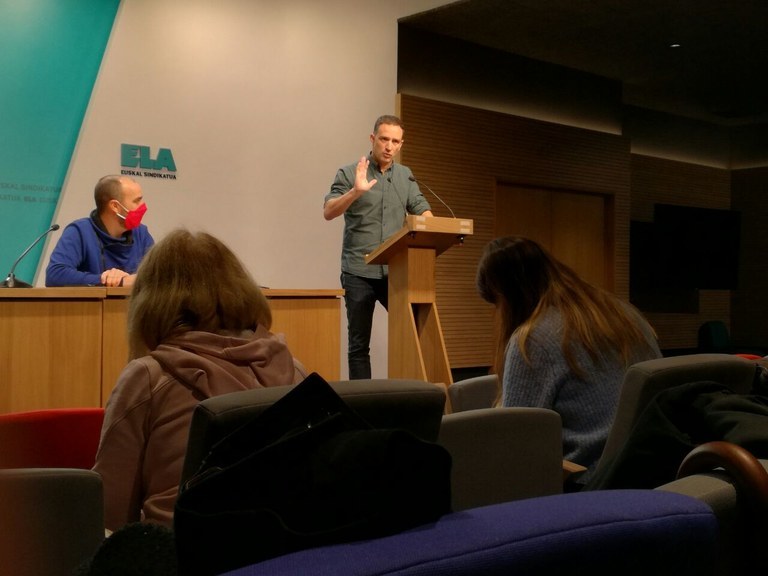ELA recalls that rejecting the Decree-Law is the only way towards the repealing of Zapatero and Rajoy’s labour reforms

Today, ELA has underscored in a press conference that “opposing the approval of the Decree-Law on the labour reform that will be voted over the next few weeks in the Congress is the only way to move forward in the repealing of the labour reforms imposed by Zapatero and Rajoy in 2010 and 2012”, as indicated by Mitxel Lakuntza, Secretary General of the trade union. “If we analyse the text agreed upon by the Government of Spain, CCOO, UGT and the CEOE, there are only a few very slight improvements, in exchange for consolidating the large part of some reforms that were very damaging for the working class and which, if this decree is validated, will continue to do so,” Lakuntza warned.
“Ultimately, PSOE and Podemos have used the social dialogue table to renege on their electoral programme (where they announced the repeal of Rajoy’s labour reform), with greater ease; here they have used CCOO and UGT, which in addition to consolidating the more detrimental steps of those reforms, are devoting these days to preventing their agreement with the CEOE could be improved in the Congress; it is a very sad role for a trade union.” Rajoy himself has summarized it “better than anybody else”, Lakuntza recalled: “The labour reform remains as it was.”
Along with Mitxel Lakuntza the head of Collective Bargaining at ELA, Peio Igeregi also appeared, who recalled that “the labour reforms of 2010 and 2012 weakened the work force’s relations: they made dismissal cheaper and easier; they allowed companies to unilaterally modify agreements made with trade union representatives; they gave priority to State agreements, which worsened the working conditions, etc.”
The current agreement maintains these central elements, “in exchange for small improvements” Igeregi emphasised, “many of which have been brought by jurisprudence of the Supreme Court, not by the agreement (disappearance of the works contract, the recovery of ultra activity or the changes in outsourcing contracts.) In exchange for almost nothing, the CEOE has managed to maintain and perpetuate what was essential for the employers.”
ELA considers that a labour reform cannot be approved if it does not limit dismissal and without clearly regulating the fact that in Euskal Herria the provincial agreements have priority over the State ones. For this reason, the Congress cannot approve this labour reform and PNV and EH Bildu must vote against it, in order for the negotiations to be restarted, but this time without granting the right to veto to the CEOE.
“The worst result of this agreement,” Igeregi underscores, “was burying the possibility of repeal.
The 2012 reform was imposed by the Partido Popular, without any trade union participation. When the time comes to reverse this reform, it is totally disappointing that the Government, CCOO and UGT are seeking an agreement with the CEOE.”
The conclusion is clear, the signatories of the agreement want to maintain the central elements of the 2012 labour reform in the short term; they are foregoing deeper changes; they have thwarted those who have fought for the repeal and additionally, they will not avoid any possible cutbacks in the future. This is the Social Dialogue and the alternative lies in mobilization, a route that ELA is working on with other organizations in Euskal Herria and in other territories in the State.
